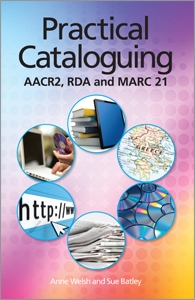
Practical Cataloguing: AACR2, RDA and MARC21
Customers outside of North America (USA and Canada) should contact Facet Publishing for purchasing information.
Primary tabs
You don't need to be an ALA Member to purchase from the ALA Store, but you'll be asked to create an online account/profile during the checkout to proceed. This Web Account is for both Members and non-Members.
If you are Tax-Exempt, please verify that your account is currently set up as exempt before placing your order, as our new fulfillment center will need current documentation. Learn how to verify here.
- Description
- Table of Contents
- About the authors
- Reviews
The launch of RDA: Resource Description and Access has already transformed cataloging standards. Written at a time of transition in international cataloging, this new book offers guidance to help catalogers make a smooth transition to RDA. Offering a step-by-step guide for mapping these new standards onto existing rules for description, this book thoroughly covers FRBR (Functional Requirements of Bibliographic Records) and FRAD (Functional Requirements of Authority Data), on which the new rules are built, and explores how RDA elements can be incorporated into MARC21.
Authors Welsh and Batley provide readers with an introduction to current catalogs and standards and examine publication formats, bibliographic elements, access points, and headings. This complete guide to RDA includes coverage of its development, structure, and features, plus a section that addresses its similarities and differences with AACR2. The authors also explain the MARC21 record, studying tags, indicators, and sub-field codes. This book will be essential reading for students of library and information studies and practicing library and information professionals in all sectors.
1. Catalogues and cataloguing standards
- Ranganathan
- Cutter
- Lubetzky
- The Paris Principles, ISBD, AACR, RDA
2. The FRBRization of the catalogue
- Relationships at the heart of the catalogue
- Works, expressions, manifestations and items
- Relationships to people
3. Bibliographic elements
- Format first
- Identifying the bibliographic elements
- Title and statement of responsibility
- Edition area
- Publication area
- Date of publication
- Punctuating the publication, distribution, etc area
- Physical description area
- Series area
- Note area
- Standard number and terms of availability
- Conclusion
4. Access points and headings
- What are access points and why do we need them?
- ‘Every reader his book’
- Defining the author
- Defining the title
- Access points in the modern catalogue
- Name authority control
- Headings for corporate bodies
- Titles
- Multipart works and series
5. RDA: resource description and access
- Timeline to change
- Changes
- The development of RDA and its principles
- FRBR as the foundation of RDA
- Relationships between entity groups
- FRBRizing the catalogue
- Practical cataloguing today
6. AACR and RDA
- Introduction
- Title proper
- Statement of responsibility relating to title
- Media type
- Illustrative content
- Creator
- Related work
- Conclusion
7. MARC 21
- What is MARC 21?
- Catalogue format, not cataloguing code
- The structure of a MARC record
- Main entries and added entries revisited
- Punctuation
- Common MARC 21 fields
- The impact of RDA
8. Practical cataloguing: bringing it all together
- Key activities for cataloguing managers
- Key activities for cataloguers
- Key activities for the beginning cataloguer
9. The birth of RDA and the death of MARC?
- Testing resource description and access: final recommendations
- ‘MARC must die’
10. Examples
- Sample records for JH Bowman Essential cataloguing. London: Facet Publishing, 2007
- Sample records for Derek Adams Unconcerned but not indifferent. Colchester: Ninth Arrondissement, 2006
- Sample records for Pascale Petit The wounded deer. Huddersfield: Smith Doorstop, 2005
- Sample records for Jasmine Ann Cooray Everything we don’t say. London: Tall Lighthouse, 2009
- Sample records for Joanna Ezekiel Centuries of skin. Snitterfield: Ragged Raven, 2010
- Sample records for Henry Charles Moore Noble deeds of the world’s heroines. London: Religious Tract Society, 1903
- Sample records for W Carew Hazlitt (ed) The essays of Michel de Montaigne. London: George Bell & Sons, 1892
- Sample records for David Pearson Provenance research in book history: a handbook. London: British Library, 1998
- Sample records for John H Ingram The poetical works of Elizabeth Barrett Browning, from 1862 to 1844.London: Griffith, Farran, Okeden & Welsh, [18––]
- Sample records for The Library of Babel, in and out of place, 25 February – 13 June 2010. London: Zabludowicz, 2010
Anne Welsh
Anne Welsh is Lecturer in Library and Information Studies at University College London, and Digital Identity Manager at UCL Centre for Digital Humanities. She spent fifteen years as a librarian before becoming a full-time academic and now teaches Cataloguing on UCL's MA LIbrary and Information Studies (MA LIS) and Historical Bibliography on its MA LIS, MA Archives and Records Management and MA/MSc in Digital Humanities. She has chaired CILIP's Executive Briefings on RDA since they began in 2009, and is a well-known conference speaker at national and international level. A former editor of Catalogue and Index, Anne is now the Assistant Editor of Alexandria: The Journal of National and International Library and Information Issues.
Sue Batley
Sue Batley is Course Director for the MA in Information Management, London Metropolitan University, UK.
"Comprehensive, practical, clear, and written with a dash of humour – this is the textbook about AACR2 and RDA for which cataloguers have been waiting."
- Karen Attar, Senate House Library
"A worthy successor to Bowman's Essential Cataloguing. Practical Cataloguing does exactly what it says on the tin: offers a practical, pragmatic approach to the basics of cataloguing in AACR2, RDA and MARC21 with useful sample records for reference."
- Celine Carty, Cambridge University Library
"...a fine example of the kind of transitional work needed as we move forward with implementation and practical application of RDA."
- Shawne D Miksa, University of North Texas


